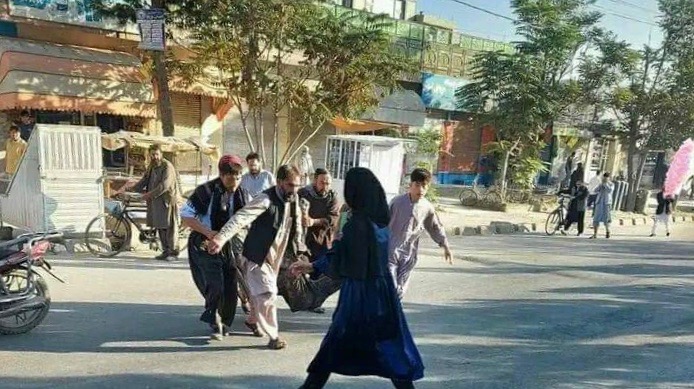Following a suicide attack that killed at least 43 civilians – mostly students – and injured 83 others in Kabul’s Dasht-e-Barchi, scores of women chanting “Stop Killing Hazaras” and “Stop Hazara Genocide” demonstrated against the repeated atrocities committed against the ethnic minority community on Saturday, October 1.
Women dressed in black headscarves shouted slogans criticizing the authorities for failing to protect their rights and ensure their security. The protesters marched past a hospital in Dasht-e-Barchi where several injured victims are being treated. According to Khadim Hussain Karimi, former editor of Etilaatroz, the government responded by firing in the air and arresting protesters.
Two improvised explosive devices were detonated on September 30 inside an education center in western Kabul, in a predominantly Hazara-majority region. “Students were preparing for an exam when a suicide bomber struck at this educational center,” Al Jazeera quoted police spokesman Khalid Zadran as having said. There were reportedly nearly 600 students at the center when the attack was carried out.
UNICEF Afghanistan condemned the attack, saying that “violence in or around education establishments is never acceptable. Such places must be havens of peace where children can learn, be with friends, and feel safe as they build skills for their futures. Children and adolescents are not, and must never be, the target of violence.”
While no militant outfit has so far taken responsibility for the attack, similar attacks in the Dasht-e-Barchi neighborhood have been attributed to Afghan ISIL affiliates in the past.
Two similar explosions took place in April, both targeting education centers (Abdul Rahim Shaheed High School and Mumtaz Education Center) killing at least six people and injuring 20 others. In May 2021, explosions near a girls’ school in the Dasht-e-Barchi neighborhood left 85 dead.
Educational institutions – especially those for women – have been at the center of contention in Afghanistan following a ban imposed by the Taliban on secondary education for girls. International rights organization Save the Children has said that “almost 80% of girls have been denied their right to education in provinces in Afghanistan where secondary schools have remained closed for girls.”
The situation in Afghanistan continues to remain dire following US sanctions and their seizure of Afghan central bank assets. According to the United Nations Office for the Coordination of Humanitarian Affairs (UNOCHA) in Afghanistan, at least 24 million in the country require humanitarian assistance to survive, while 25 million people live in poverty and 19 million face major food insecurity.





